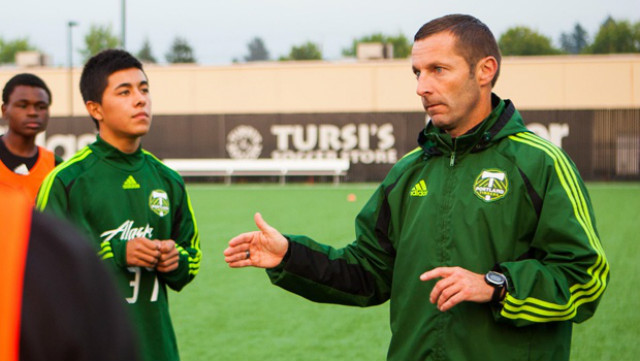 Timbers Academy Director Mike Smith in France
Timbers Academy Director Mike Smith in FrancePhoto courtesy Portland Timbers

At the end of February, Major League Soccer announced a partnership with the French Football Federation, launching a program aimed to improve player development across the U.S. top flight’s Academy system.
 Timbers Academy Director Mike Smith in France
Timbers Academy Director Mike Smith in FranceAround the same time, one representative from each club traveled to Europe to begin the Elite Formation Coaching License course, which is a 16-month program scheduled to culminate in June 2014, with the overall aims of furthering coaching education at MLS clubs.
The coaches traveled to Clairefontaine, France (home the FFF’s storied training facilities) for a weeklong stint studying in the classroom, before splitting off separate ways to observe academies at five teams in Europe: Real Madrid, Athletic Bilbao, Stuttgart, Paris St. Germain and Lyon.
“I think it’s huge,” Houston Dynamo Academy Director James Clarkson said of the partnership. “It’s a major, major step forward by the MLS, a major commitment by the MLS and all the individual teams. It’s a real commitment to player development.”
There is still plenty of time left between now and the end of the course, as the first two weeks involved a lot of coaches simply trying to absorb information over a short period of time. But it was clear that plenty was learned from just the short time in France and in different parts of Europe.
“I think that the biggest [takeaway] is learning a new methodology on how the French do things in their system,” D.C. United U18 head coach Nolan Sheldon told TopDrawerSoccer.com. “They place a very high emphasis on developing the creativity and autonomy of the player, that’s something that I really enjoy, really appreciate and learned a lot from that area.
“From my perspective, they’re very patient, they put a great deal of emphasis on developing the person and creating a very confident, not relaxed necessarily, but a secure training atmosphere to try new things, to learn, to be open to coaching throughout their years.”
Said Sounders Academy Director Darren Sawatzky: “It was incredibly useful information. They’ve been training for a hundred years over there and for us that have been running academies for 3-5 years, it’s a little bit naïve to say that you have the knowledge that they do."
Another added benefit to the trip – aside from the learning and observing process – was simply bringing 19 MLS Academy coaches and directors all in one place for even just a week. MLS Academy sides face each other sporadically throughout the Development Academy season, and coaches only see one another in passing at the large Showcase events, sometimes having time to chat and share things in between coaching and keeping tabs on players.
The first week of the trip in France in particular gave them time to bounce ideas off each other, help one another digest the information presented, and also allow for some critical thinking.
“When you reflect on it, we haven’t done a good enough job working together,” Clarkson said. “And I think that this course will definitely bring everybody closer, when we sit down and discuss things, we’re all faced with similar issues and I think working together for the benefit of the game and growth of the game and the development of the players, I think can only benefit everybody.”
Added Sporting KC Academy Director Jon Parry: “It gave us the chance to exchange ideas and say ‘what are you doing in your market.’”
The second week of the program, in the first week of March, featured a new venue. Coaches went their separate ways to the five clubs, having the chance to watch training in different corners of Europe. Parry was one of the coaches to travel to Stuttgart, where he saw each level of training and spotted some notable differences between MLS and the German club.
“The players, there’s not really a bottom third or a middle third – there’s a strong group of players all the way through,” he told TopDrawerSoccer.com. “Those kids grow up, come into the academy thinking they’re going to be professionals. And I think that’s where American kids, our culture is different.”
The KC Director also remarked about the vast difference in the size of coaching staffs, as Stuttgart had head coaches, assistant coaches and goalkeeping coaches to work with the aspiring pros. Of course, part of that is due to the resources available to the club, with around $9-10 million available per year for youth development, much more than what MLS clubs have at their disposal.
Sawatzky’s time with Athletic Bilbao – a club that can only employ players from Spain’s Basque region – was even more eye opening, as development is vital to the club’s survival.
“It was an amazing experience,” he said. “It’s an area with a 1.2 million person catch basin and that’s the only place they can bring players in from because they’re a Basque-only team. They only allow players from their local area to play on their pro club, so they have to do it well, they have to develop players, there’s no way around it because they don’t allow foreign players into their club.”
Each coach interviewed praised the value of the course, as it taught new ideas and specifically detailed the different values of player development in places like France, Germany and Spain.
And it’s very early in the life of the coaching course, and no doubt coaches are parsing through information and letting things marinate. Over the long run, it’s certainly a positive step forward for MLS and player development in the United States.